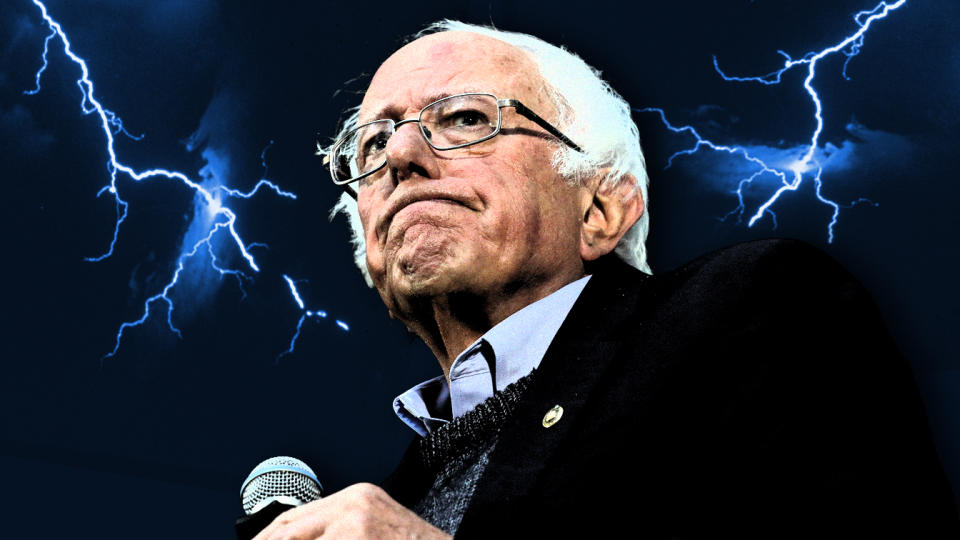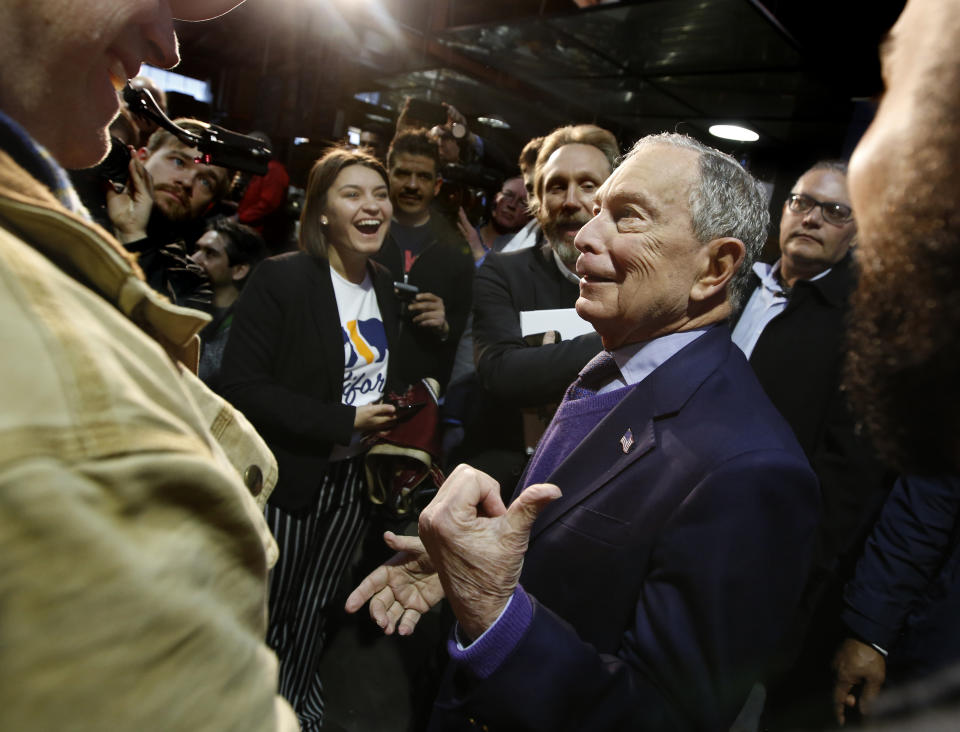The establishment isn't stopping Bernie Sanders
WASHINGTON — When the Democratic Party changed the rules for presidential debates starting next month, a senior adviser to Bernie Sanders decried the rules change as the “definition of a rigged system.”
When the Des Moines Register abruptly canceled the release of its last poll two nights before the Iowa caucuses, some supporters of Sanders said it was all part of a plot to hide the momentum of the Democratic senator from Vermont.
And when the results of the Iowa caucuses were not released on Monday night, it was President Trump’s own sons who trolled the Democratic Party by accusing it of trying to hurt Sanders, who essentially shared the lead with South Bend Mayor Pete Buttigieg when partial results were finally released Tuesday afternoon.
But in fact, the Register’s decision to cancel the poll was by most accounts a panicked reaction to a small flaw in the survey rather than a nefarious scheme. And the caucus fiasco was the result of an inadequately tested mobile application, combined with new reporting requirements that had been requested by Sanders himself in the name of transparency and fairness.
The poll cancellation and the caucus debacle, in particular, illustrate the difference between perception and reality when it comes to the political establishment. The supposedly all-powerful establishment is a boogeyman that can serve as a motivational tool for many Sanders supporters, while in actuality it is a terrified mess, according to longtime political operatives.
“I think the ‘establishment coming after us’ is more a narrative pushed by the Bernie camp to rally their troops,” Ben LaBolt, a former Obama White House spokesman, told Yahoo News.
The establishment had real power in the past, but Sanders’s strong showing in the Iowa caucuses proves its influence is waning. He now has a full head of steam with just a week before the New Hampshire primary, in which he has a commanding lead in the polls.
Not only is the establishment failing to stop Sanders, few prominent Democrats are willing to criticize him publicly.

“Everyone is waiting for someone else to point out that the guy would be a general election catastrophe,” said Matt Bennett, co-founder of Third Way, a moderate Democratic advocacy group vilified among progressives as the recipient of corporate donations.
Certainly the leadership of the Democratic National Committee is terrified of appearing anything but impartial after the 2016 Democratic primary, when internal emails hacked by the Russian government and leaked to the press showed favoritism toward Hillary Clinton over Sanders. The DNC scrambled last week to explain that the debate rules changes were not intended to aid the candidacy of former New York City Mayor Michael Bloomberg.
And a Politico article that reported loose talk among a half-dozen DNC members, part of a 447-member committee, about changing the convention rules, drew an aggressive response from DNC spokeswoman Xochitl Hinojosa. “No no no no no,” Hinojosa tweeted in response. A former Obama White House official called the article “irresponsible.”
Political parties and their leaders — the traditional vehicles for power in American politics — have been growing weaker for decades. They control less and less when it comes to choosing their own candidates for office. And there is not much appetite to change that.
“They don’t want to be key actors in selecting candidates and framing voter options. They just want to prove that they are totally and equally open to any candidate and then to serve as the arena for voter decisions,” said Yuval Levin, author of the new book “A Time to Build.”
That said, there are still a few tools left for those in the establishment — such as it is — if it wants to defeat a populist insurgent candidate such as Sanders, who for most of his nearly 30 years in Congress was not a member of the Democratic Party.
The first would be to consolidate. Or, as Jeb Bush put it in an email to Yahoo News, “don’t divide the remaining vote.”
Bush, the former Florida governor, was the frontrunner for the 2016 Republican nomination. But he and several other mainstream candidates — Marco Rubio, Chris Christie, John Kasich and others — split up the majority of the vote, allowing Trump to win many of the early primary contests with little more than 30 percent of the vote.

Political parties and party leaders wielded a stronger hand in the past and made sure the majority of the vote wasn’t divided like this. But that kind of party boss became a relic some time ago. Modern parties face a problem common to most institutions in the modern era: how to facilitate or lead collective action.
It’s a big question, and there don’t appear to be any easy answers.
In the 2020 Democratic primary, it’s possible that the progressive wing, which is divided between Sanders and Sen. Elizabeth Warren, D-Mass., will unify around one candidate sooner than the centrist wing, which might take a while to decide among former Vice President Joe Biden, Sen. Amy Klobuchar, D-Minn., Buttigieg and Bloomberg.
The establishment could also organize a public messaging campaign.
“There still is a shared voice. You can still drive the conversation around something,” Tim Miller, a veteran Republican campaign operative, told Yahoo News. “I don’t know if it’s going to work, but if the establishment figures look at Bernie and find that he’s very vulnerable on this or that issue, they still have the ability to make the issue a big deal.”
Faiz Shakir, Sanders’s campaign manager, agreed with Miller.
“People who are still the formers of conventional wisdom of our political debate, that still does exist: a political chattering class through the media,” Shakir told Yahoo News.
That kind of public messaging strategy could unfold through paid advertisements and through a coordinated approach among political groups. But here, too, there are multiple obstacles. Organized action offends the sensibilities of many voters and is easily cast as pernicious.
In addition, few might have the stomach for the only approach that Miller argued would work: all-out political combat.
“I’ve not seen anything that has worked other than capitulating or complete and utter scorching of the earth, a full-frontal attack on the insurgent, using everything at your disposal,” said Miller, who worked for Jeb Bush’s 2016 campaign. Miller cited the 2014 campaign of former Sen. Thad Cochran, R-Miss., as an example of taking out a populist insurgent through no-holds-barred attacks and tactics.

And there is plenty of material — otherwise known as “opposition research” — on Sanders. New York Magazine’s Jonathan Chait went through much of it in a recent column: ticking off some of Sanders’s radical policy proposals as well as his association decades ago with the Socialist Workers Party. There’s no question that if Sanders were the Democratic nominee, Trump and his campaign would be eager to attack him on these points.
Bloomberg could also decide to wage that kind of message battle against Sanders. Bloomberg, a multibillionaire, has the resources to do so and potentially to outlast the other mainstream candidates.
If Bloomberg can last until the Democratic convention in Milwaukee this July, that’s significant. But if Sanders has consolidated a plurality of primary vote totals between 30 percent and 40 percent, winning a large number of contests through the process, then the idea of him as the most democratically favored candidate would take hold.
It happened in 2016. Trump was the choice of only a third of primary voters and had support from no one in the Republican establishment. He didn’t even have over 30 percent support of the convention delegates.
But he had the clear imprimatur of being the people’s choice because the party had failed to unify around its own candidate. There were attempts to stop him at the convention in Cleveland, but they fell well short because most political actors had no appetite for taking on public opinion.
Bloomberg may have the ability, technically, to make it to Milwaukee. But he may be overlooking the way primary frontrunners gather momentum until they are usually runaway trains, in part because the public comes to see them as the legitimate winner, even if a majority of primary voters have supported a large roster of other candidates, as happened with Trump in 2016.
The Sanders campaign feels very well prepared to take on Bloomberg, who has been spending record-breaking amounts on advertising.
Bloomberg “personifies what establishment means: the ability and power to control money and influence,” Shakir said in a phone interview.
But the real question for voters, he continued, is which candidate they believe can fight for them.
“That’s what this entire primary is about: Who do you think is the candidate we’re going to put up on that debate stage against Donald Trump who the working class will trust and believe,” Shakir said. “That’s a clear-cut case. That’s Bernie.”
_____
Read more from Yahoo News:




